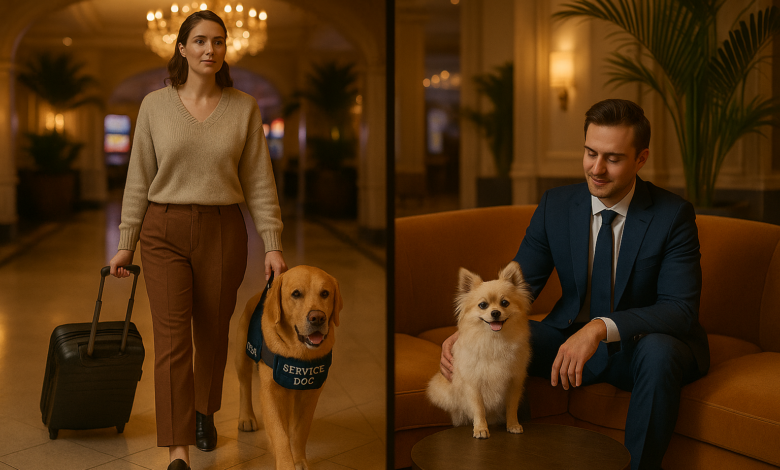Are Emotional Support Animals Allowed in Hotels in Las Vegas?

Traveling with an animal can make the difference between a stressful trip and a manageable one, especially for people living with disabilities or mental health conditions. But in Las Vegas, not all animals are viewed the same under the law. The difference between a service animal and an emotional support animal (ESA) isn’t just a technicality — it determines whether your companion is legally guaranteed access to hotels or left up to the property’s discretion. If you’re bringing your animal along for a Vegas stay, understanding these rules before you book can save you from unexpected fees, restrictions, or even a denied check-in.
What Is a Service Animal?
A service animal isn’t considered a pet — it’s a trained working partner that performs specific tasks directly tied to a person’s disability. The most familiar examples are guide dogs for people who are blind or visually impaired, but service animals also include hearing dogs for the deaf, mobility assistance dogs that help with balance or retrieving items, and psychiatric service dogs trained to disrupt panic attacks or provide grounding during dissociation. Under the Americans with Disabilities Act (ADA), service animals are legally recognized as medical aids, much like a wheelchair or oxygen tank.
For Las Vegas hotels, this means service animals are non-negotiable. They must be welcomed in every part of the property — from the lobby to the elevators, restaurants, casinos, pools, and guest rooms. Hotels cannot charge a pet fee, deposit, or cleaning surcharge, nor can they impose breed, size, or weight restrictions. Staff are only allowed to ask two questions: whether the animal is required because of a disability, and what tasks it has been trained to perform. That’s it. They cannot demand medical paperwork, licenses, or proof of training. This protection ensures that travelers with service animals can confidently book a stay anywhere in Las Vegas without worrying about being turned away.
What Is an Emotional Support Animal?
Emotional support animals fill a very different role. Unlike service animals, they are not trained to perform tasks — instead, their purpose is to provide comfort through companionship. ESAs are often prescribed to individuals with conditions like anxiety, depression, or PTSD, and while their benefits are well-documented, they do not meet the ADA definition of a service animal. This difference has big implications for travelers.
Hotels in Las Vegas are not required to accept emotional support animals. Instead, ESAs fall under standard pet policies, which means every hotel can make its own rules. Some pet-friendly resorts may welcome them with open arms but attach nightly pet fees, deposits, or restrictions on size and breed. Others may limit where they can go on the property or ban them outright. Importantly, even presenting an ESA letter from a licensed mental health professional does not guarantee your animal’s acceptance at a hotel. If the property doesn’t allow pets, they’re within their rights to decline an ESA.
Key Differences Between Service Animals and ESAs
The biggest distinction comes down to training and legal protection. Service animals are task-trained to assist with a disability and are fully protected under the ADA, which means hotels must accept them without fees, restrictions, or exceptions. Emotional support animals, on the other hand, provide comfort but lack specialized training, so they are not covered by the ADA. Their acceptance depends entirely on a hotel’s pet policy.
In real terms, this means travelers with service dogs can book any Las Vegas hotel knowing their animal will be welcomed, whether it’s a luxury resort on the Strip or a smaller boutique property. Travelers with ESAs, however, have more legwork to do. They need to confirm pet policies ahead of time, budget for fees, and be prepared for restrictions that may not apply to other guests.
What This Means for Travelers in Las Vegas
If you’re traveling with a service animal, Las Vegas hotels are required to treat your companion as an essential medical aid. You’ll have access to the full property without fees or restrictions, just as you would anywhere else in the U.S. If you’re traveling with an emotional support animal, things aren’t as straightforward. Some resorts and hotels are pet-friendly and may welcome your ESA for an additional fee, but others may decline altogether.
The safest approach is to call the hotel before you book and ask direct questions. Do they allow emotional support animals? What fees or deposits apply? Are there weight or breed restrictions? Getting clear answers ahead of time helps you avoid surprises at check-in. And remember: if your animal is a psychiatric service dog trained to perform specific tasks for your mental health, it qualifies as a service animal under the ADA — meaning you’re legally protected no matter which Las Vegas hotel you choose.
